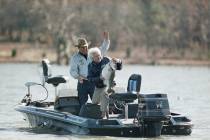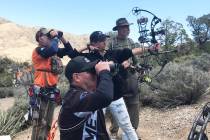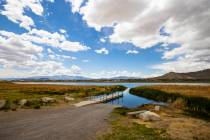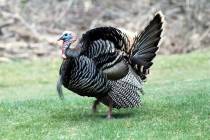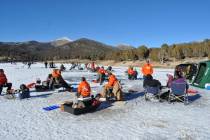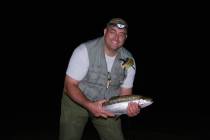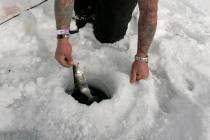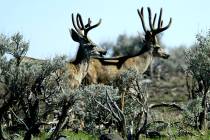School sharpens bass fishing skills
As Hyrum slid behind the wheel of the 21-foot, custom-painted Skeeter bass boat, I was more than a little nervous. Knowing a 225-horsepower outboard was on the back didn't help. Though he is 12, Hyrum already has a well-earned reputation as The Wildman, mostly because he knows no fear. He'll try just about anything at least once, especially if it involves speed or heights.
I began to voice my concern when Gary Thien, our host at the Bank Robber Bass Fishing School, explained that learning to operate a bass boat was part of the curriculum. "He's got to learn how to drive a boat if he's going to catch bass," Thien said as he slid into the seat next to Hyrum and told him to push on the gas pedal. Soon we were speeding across Lake Havasu with the former bass fishing pro coaching Hyrum on the finer points of boat operation while my daughter, Sherese, and I were hanging on for dear life.
Our day began with an introduction to what Thien calls the Four Ps of fishing success: prepare, practice, process the information you gather on the water and perform. These fundamentals, he explained, will help anglers of any skill level.
At Lake El Salto in Mexico in 2002, Thien used these principles to catch a five-fish limit weighing 63 pounds, 14 ounces -- a new lake record. Those fish were caught during a three-day tournament in which Thien caught and weighed more 700 pounds of fish. The smallest of the five fish weighed 11 pounds, 9 ounces and the largest 14 pounds, 12 ounces. I was impressed.
During the classroom portion of the school, Thien introduced us to the rig that his school is named for. He developed the Bank Robber rig while preparing for a major 200-boat tournament. The rig is based off the logic that bass eat things that swim and crawl. It features a swimming bait up high, followed by a weight and a crawling bait on the bottom.
Part of the preparation process, Thien said, is knowing your quarry, so we learned about bass biology and behavior. We practiced on the school's indoor casting range and learned about flipping, pitching and casting in general. Then we launched the boat and made our way to a small bay where we began working on the practical application of the principles we learned in the classroom.
Thien pointed out the structure below us in the lake and explained how bass use structure for protection and to locate a meal. As we worked our baits around the structure, Sherese caught a catfish while Thien and I each caught a largemouth bass. Throughout the afternoon, we fished near any structure we could find and thoroughly worked the edges of points where the light-colored shallow water gives way to the dark color of the deep water. We brought nine bass into the boat, including a smallmouth that Thien estimated to weigh more than 3 pounds.
Our second day of school also started in the classroom, where we learned about drop-shot techniques, fish identification and the psychology of fishing. Then we went back to the lake where we applied what we had learned in a practical setting. While the fishing wasn't as good the second day, the learning was. Thien worked with the kids on their fishing and boat-handling skills in one boat while Ed, his brother and partner in the school, worked with me on my casting and water-reading skills in another.
While Thien acknowledges that everything he teaches can be found on the Internet, on television or in magazines, he believes that having someone show an angler how to do something is most effective.
Thien's school is based in Lake Havasu City, Ariz. More information is available online at www.bank robberbassfishingschool.com.
Freelance writer Doug Nielsen is a conservation educator for the Nevada Department of Wildlife. His column is not affiliated with or endorsed by the department. Any opinions he states in his column are his own. He can be reached at doug@takinitoutside.com.









